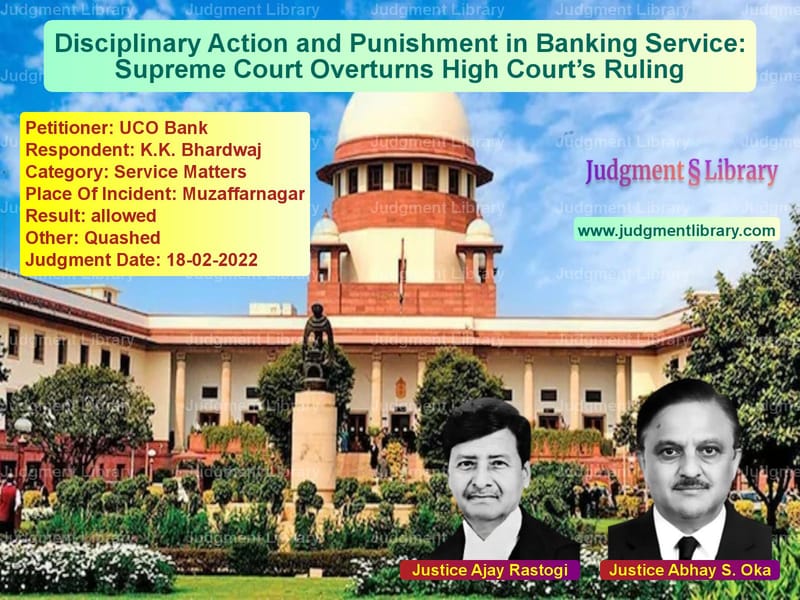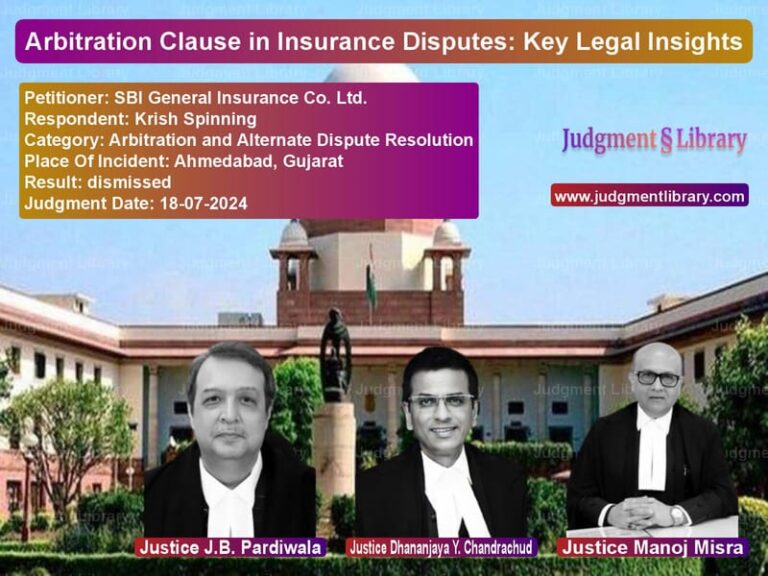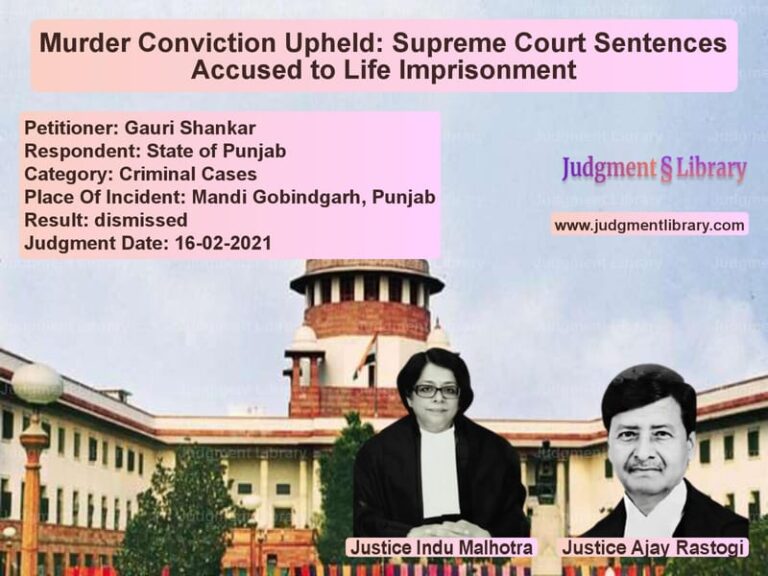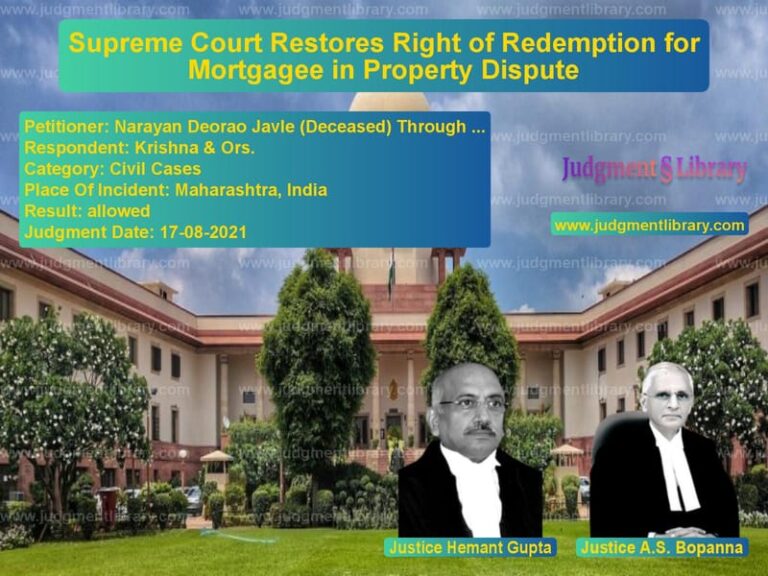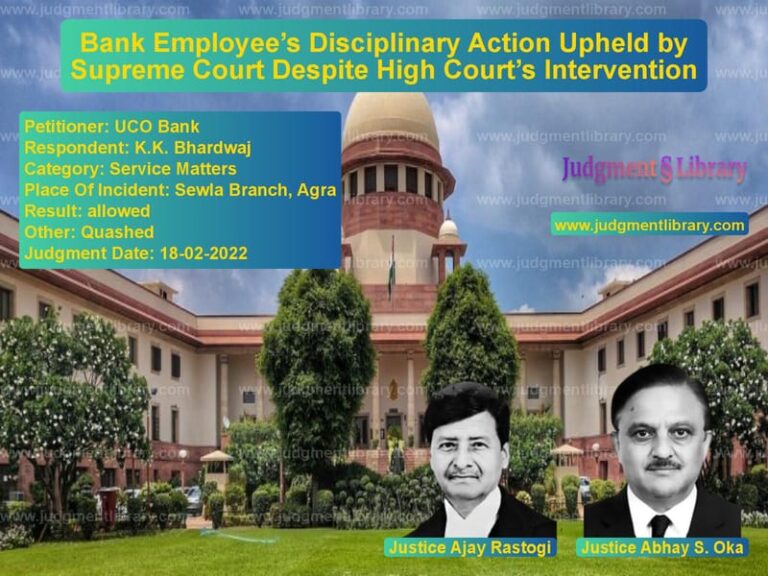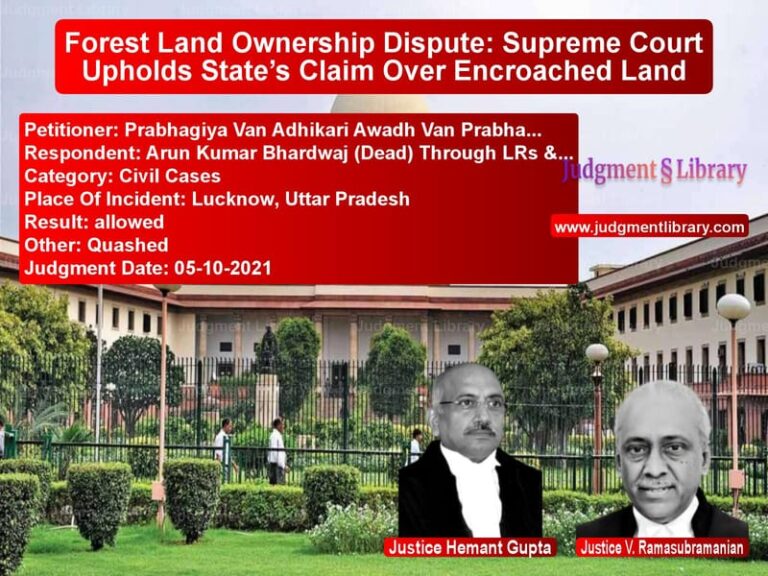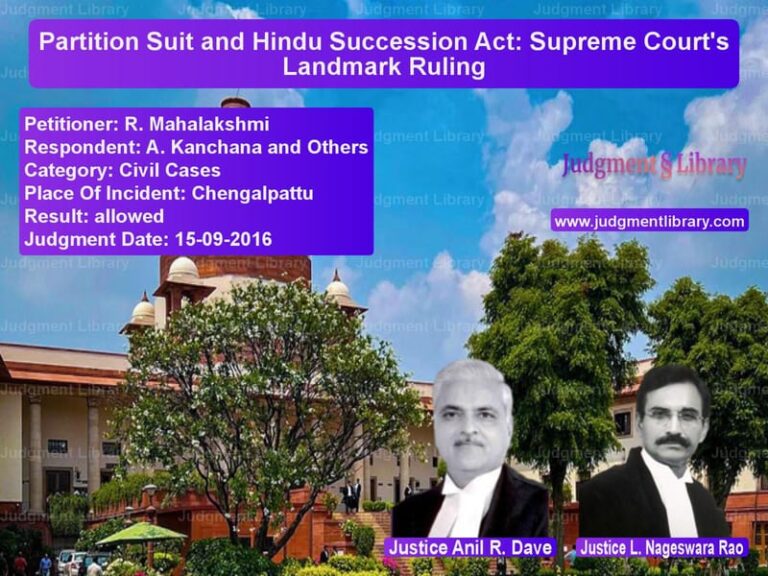Disciplinary Action and Punishment in Banking Service: Supreme Court Overturns High Court’s Ruling
The Supreme Court of India, in its judgment dated February 18, 2022, overturned the High Court’s decision to set aside the disciplinary action taken against K.K. Bhardwaj, a former employee of UCO Bank. The Court reinstated the findings of the disciplinary and appellate authorities, which had found Bhardwaj guilty of several acts of misconduct, including negligent handling of bank transactions and opening fictitious accounts. Despite the High Court’s intervention, the Court emphasized the correctness of the inquiry process and the punishment imposed on Bhardwaj.
Background of the Case
The respondent, K.K. Bhardwaj, had served as a manager at the Taharpur Bhabisa branch of UCO Bank. During his tenure, he was accused of several irregularities, including opening bank accounts without proper documentation and facilitating fraudulent transactions. These actions led to an investigation and a departmental inquiry, which concluded that Bhardwaj had committed misconduct in violation of the bank’s conduct regulations. As a result, Bhardwaj was dismissed from service.
After the dismissal, Bhardwaj challenged the disciplinary proceedings in the Allahabad High Court, arguing that the charges were vague and lacked sufficient particulars. The High Court ruled in his favor, setting aside the disciplinary proceedings and the consequent punishment, leading to an appeal before the Supreme Court.
Legal Proceedings
- 1993: Charge sheet issued against Bhardwaj for misconduct involving opening fraudulent accounts and mishandling transactions.
- 1996: Bhardwaj was dismissed from service after the conclusion of the departmental inquiry.
- 1998: The appellate authority upheld the findings but reduced the severity of the punishment.
- 2021: The High Court quashed the disciplinary proceedings, claiming the charges lacked specificity and fairness.
- 2022: The Supreme Court allowed the bank’s appeal, reinstating the disciplinary decision and dismissing the High Court’s judgment.
Arguments Presented
Petitioner’s (Bank’s) Arguments
The appellant, represented by UCO Bank, argued:
- The disciplinary inquiry was conducted in accordance with the rules, and the findings were well-supported by evidence.
- The High Court’s assumption that the charges were vague was incorrect, as the charges were clear and specific.
- The appellate authority had taken a lenient view by modifying the punishment, and there was no reason to interfere with the decision.
Respondent’s (Bhardwaj’s) Arguments
The respondent contended:
- The charges, particularly charge no. 1, were vague and lacked material particulars, which violated the principles of natural justice.
- The punishment imposed was disproportionate and based on incomplete findings, and the disciplinary process was flawed.
- Even if found guilty, the punishment should have been modified further, as the alleged misconduct was not severe enough to warrant dismissal.
Supreme Court’s Observations
On the Specificity of the Charges
The Court found:
“The charges against Bhardwaj were neither vague nor unclear. The allegations related to serious misconduct, including the opening of fictitious accounts and improper handling of funds, which were properly addressed in the inquiry process.”
The Court emphasized that the charge sheet was clear and that Bhardwaj had been given adequate opportunity to respond to the allegations.
On the Inquiry Process
The Court noted:
“The disciplinary and appellate authorities followed the prescribed procedure and based their findings on substantial evidence. The inquiry process was fair, and Bhardwaj’s participation in the proceedings further strengthened the validity of the inquiry.”
On Judicial Review in Disciplinary Matters
The Court reiterated the limitations of judicial review in matters of disciplinary proceedings:
“While exercising judicial review, courts cannot assume the role of the appellate authority and interfere with factual findings unless there is a clear violation of the principles of natural justice or procedural fairness.”
The Court further stated that interference was only warranted if the inquiry had serious procedural defects or if the punishment was manifestly disproportionate.
Final Judgment
The Supreme Court ruled:
- The appeal was allowed, and the decision of the High Court was set aside.
- The disciplinary proceedings and the punishment imposed by UCO Bank were upheld.
- The Court reaffirmed the principles of judicial review, emphasizing that courts should not interfere with disciplinary decisions unless there are significant procedural errors or violations of natural justice.
Implications of the Judgment
This ruling has several key implications:
- Disciplinary Procedures in Public Sector: The judgment reinforces the importance of adhering to established procedures in disciplinary actions, ensuring fairness and accountability in public sector employment.
- Judicial Review in Employment Matters: It clarifies that judicial review in disciplinary cases is limited to ensuring fairness and compliance with legal procedures, without substituting the Court’s judgment for that of the disciplinary authority.
- Employer’s Authority: The ruling strengthens the authority of employers in the public sector to take disciplinary action based on valid findings and evidence, even in the face of challenges from the employee.
The Supreme Court’s decision ensures that public sector disciplinary processes remain robust, with judicial oversight limited to safeguarding due process rather than interfering with the substance of the findings.
Petitioner Name: UCO Bank.Respondent Name: K.K. Bhardwaj.Judgment By: Justice Ajay Rastogi, Justice Abhay S. Oka.Place Of Incident: Muzaffarnagar.Judgment Date: 18-02-2022.
Don’t miss out on the full details! Download the complete judgment in PDF format below and gain valuable insights instantly!
Download Judgment: uco-bank-vs-k.k.-bhardwaj-supreme-court-of-india-judgment-dated-18-02-2022.pdf
Directly Download Judgment: Directly download this Judgment
See all petitions in Employment Disputes
See all petitions in Disciplinary Proceedings
See all petitions in Public Sector Employees
See all petitions in Judgment by Ajay Rastogi
See all petitions in Judgment by Abhay S. Oka
See all petitions in allowed
See all petitions in Quashed
See all petitions in supreme court of India judgments February 2022
See all petitions in 2022 judgments
See all posts in Service Matters Category
See all allowed petitions in Service Matters Category
See all Dismissed petitions in Service Matters Category
See all partially allowed petitions in Service Matters Category

